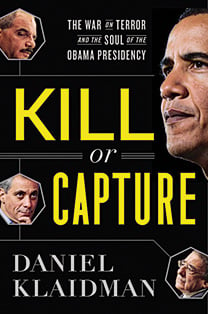REVIEW: Kill or Capture: The War on Terror and the Soul of the Obama Presidency
Book by Daniel Klaidman
Share
 This book is about the clash between President Barack Obama’s pre-election idealism on matters of security and terrorism, and the more pragmatic realities of office.
This book is about the clash between President Barack Obama’s pre-election idealism on matters of security and terrorism, and the more pragmatic realities of office.
Early in the Obama presidency, U.S. special operations forces were tracking Saleh Ali Saleh Nabhan, a leading member of al-Qaeda’s East Africa branch, al-Shabaab. He had been implicated in numerous terrorist attacks in Africa, including the 1998 U.S. embassy bombings in Kenya and Tanzania. Intelligence reports indicated Nabhan would soon be travelling on a coastal road, far from potential civilian casualties. Capturing him might reveal valuable intelligence. But where to hold him? Obama had no detention policy for terror suspects captured outside established war zones like Iraq and Afghanistan. He had ordered the CIA to close its secret black sites. He was committed to emptying Guantánamo, not filling it with new prisoners. And he couldn’t easily prosecute Nabhan in the U.S. because of political reasons.
Nabhan died when American helicopters strafed his jeep. No direct evidence has emerged that American forces sought to kill rather than capture him, writes Klaidman, but adds: “The inability to detain terror suspects was creating perverse incentives that favoured killing or releasing suspected terrorists over capturing them.” Indeed, by his third year in office, Obama had approved the killings of twice as many suspected terrorists than had ever been imprisoned at Guantánamo Bay. Are extrajudicial assassinations more just than indefinite detention in a legal black hole? Probably not, but they’re a lot less complicated.
Does this mean Obama has abandoned the rule-of-law principles he once championed? Not really. Last year another Somali terror suspect, Ahmed Abdulkadir Warsame, was taken alive and brought to the United States for a civilian trial, despite Republican howls of protest. But Obama has also made a lot of compromises. He doesn’t even talk about closing Guantánamo Bay anymore. And whether his presidency ends in January or five years from now, the prison will remain open long after he is gone.
Here’s where you can find the current Maclean’s bestsellers list, plus all of our books reviews.